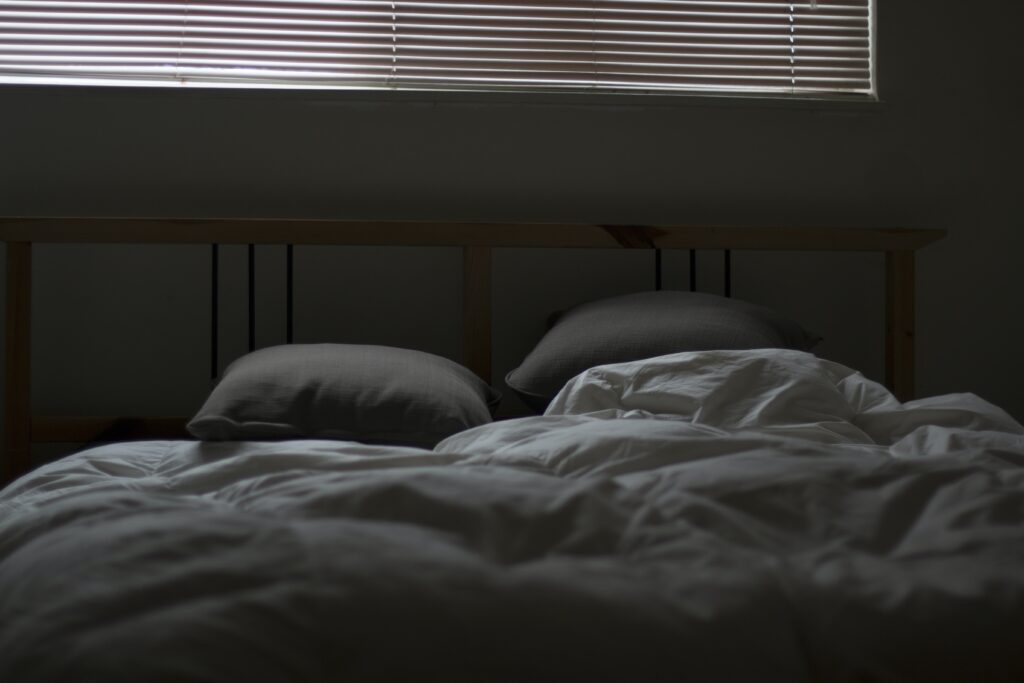Are you struggling to get a good night’s sleep? Creating a healthy sleep routine is essential for your overall well-being. In this article, you will discover simple and effective tips on how to establish a routine that promotes restful sleep and wakes you up feeling refreshed. From setting consistent bedtimes to creating a peaceful sleep environment, implementing these strategies will help you achieve better quality sleep and improve your daily productivity. Say goodbye to tossing and turning, and hello to the rejuvenating benefits of a healthy sleep routine.

Understanding the Importance of Healthy Sleep
Explaining the role of sleep in overall health
Sleep is an essential component of overall health and well-being. It is a time when our body repairs and restores itself, allowing us to wake up feeling refreshed and rejuvenated. During sleep, the body releases growth hormones that aid in tissue repair, strengthen the immune system, and promote healthy development in children and adolescents. Additionally, sleep plays a crucial role in maintaining a healthy metabolism, regulating blood sugar levels, and preventing chronic conditions such as obesity, diabetes, and heart disease.
Discussing the consequences of poor sleep habits
On the other hand, consistently not getting enough sleep or having poor sleep habits can have detrimental effects on our physical and mental health. Chronic sleep deprivation can weaken the immune system, increase the risk of accidents, and impair cognitive function, affecting our ability to concentrate, make decisions, and solve problems. It can also lead to mood disorders such as depression and anxiety, and is associated with an increased risk of developing chronic conditions like hypertension, stroke, and Alzheimer’s disease.
Describing the link between sleep and mental health
The relationship between sleep and mental health is bidirectional. While poor sleep can contribute to mental health issues, mental health conditions can also disrupt sleep patterns. Lack of sleep can worsen symptoms of anxiety and depression, making it difficult to manage emotions and exacerbating stress levels. On the other hand, mental health disorders such as insomnia, sleep apnea, and restless leg syndrome can significantly impact the quality and quantity of sleep. It is therefore crucial to prioritize healthy sleep habits to maintain good mental health and seek appropriate interventions if sleep disruptions persist.
Determining Your Ideal Sleep Schedule
How to identify your natural sleep-wake cycle
To determine your natural sleep-wake cycle, it is important to pay attention to your body’s cues and patterns. Start by keeping a sleep diary, noting the time you go to bed and wake up each day, as well as any factors that may affect your sleep, such as caffeine consumption or exercise. This will help you identify trends and patterns in your sleep schedule. Additionally, listen to your body and pay attention to when you naturally feel sleepy and when you naturally wake up without an alarm. This will give you a good indication of your ideal sleep schedule.
Understanding the concept of sleep debt
Sleep debt refers to the accumulated hours of sleep that we have missed over time. It occurs when we consistently do not get enough sleep to meet our individual needs. Each person has a specific sleep requirement, but on average, adults need around 7-9 hours of sleep per night. When we accumulate sleep debt, it is important to recognize that it cannot be fully repaid in just one night of extra sleep. Consistently getting the recommended amount of sleep is essential to prevent and reduce sleep debt.
Factors influencing individual sleep needs
While the recommended amount of sleep for adults is generally 7-9 hours per night, individual sleep needs can vary. Factors such as age, genetics, underlying health conditions, and lifestyle choices can influence the amount of sleep needed. For example, infants and children require significantly more sleep, whereas older adults may need slightly less. Additionally, individuals who engage in regular physical activity or have physically demanding jobs may require more sleep to support muscle repair and recovery. It is important to listen to your body and adjust your sleep schedule accordingly to meet your specific needs.
Establishing a Consistent Sleep Schedule
Importance of going to bed and waking up at the same time every day
One of the key elements of a healthy sleep routine is consistency in your sleep schedule. Going to bed and waking up at the same time every day, even on weekends, helps regulate your body’s internal clock, known as the circadian rhythm. This consistency helps train your body to recognize when it is time to sleep and wake up, making it easier to fall asleep and wake up naturally without relying on alarms. Regular sleep and wake times also promote a more consistent sleep quality, resulting in improved overall sleep.
Dealing with potential disruptions to the sleep schedule
While it is important to establish a consistent sleep schedule, life can often throw disruptions our way. It is important to develop strategies for dealing with potential disruptions and maintaining a healthy sleep routine. If unexpected events or responsibilities alter your sleep schedule, try to adjust your routine gradually rather than drastically, allowing your body to adapt to the changes. Additionally, if you do experience a late night or early morning, resist the temptation to compensate with excessive napping, as this can disrupt your sleep schedule further.
Adjusting sleep schedules for shift work
Shift work can pose significant challenges to maintaining a healthy sleep routine, as it disrupts the body’s natural circadian rhythm. If you are a shift worker, there are several strategies you can employ to help establish a consistent sleep schedule. Consider implementing a wind-down routine before bed to signal to your body that it is time to sleep. Use blackout curtains or an eye mask to create a dark sleep environment, and wear earplugs or use white noise machines to mask disruptive sounds. Experiment with different sleep strategies, such as splitting your sleep into two shorter periods to ensure you are getting enough rest.
Creating a Sleep-Inducing Bedroom Environment
Choosing the right temperature
The temperature of your bedroom can significantly impact your sleep quality. The ideal temperature for sleep is between 60-67 degrees Fahrenheit (15-19 Celsius), as this range supports the body’s natural drop in core temperature during sleep. Cooler temperatures promote the release of melatonin, the hormone that regulates sleep. Experiment with different bedding materials and adjust your thermostat to find the optimal temperature that promotes a comfortable and restful sleep.
Limiting light and noise
Light and noise can disrupt your sleep and make it difficult to fall asleep or stay asleep. Light exposure, especially from electronic devices, can suppress the release of melatonin and disrupt your circadian rhythm. To create a sleep-friendly environment, limit exposure to bright light, particularly in the hours leading up to bedtime. Install blackout curtains or use an eye mask to block out external light sources. Similarly, use earplugs or a white noise machine to mask any disruptive noises that may interfere with your sleep.
Importance of a comfortable mattress and pillows
Investing in a comfortable mattress and pillows is essential for a good night’s sleep. Your mattress and pillows should provide adequate support to align your spine and relieve pressure points, ensuring optimal comfort throughout the night. Select a mattress that suits your preferred sleep position and personal preferences for firmness or softness. Additionally, replace your pillows every 1-2 years to maintain adequate support and hygiene. A comfortable sleep environment promotes relaxation and helps you fall asleep faster, contributing to a healthy sleep routine.

Developing a Pre-Sleep Routine
Benefits of winding down before bed
Creating a pre-sleep routine allows your body and mind to wind down and signals to your brain that it is time to sleep. Engaging in relaxing activities before bed can help reduce stress levels and promote a state of relaxation that is conducive to falling asleep. Activities such as reading a book, taking a warm bath, practicing meditation or deep breathing exercises, or listening to calming music can help transition your mind and body from the demands of the day to a restful state ready for sleep.
Relaxation techniques to help prepare for sleep
Incorporating relaxation techniques into your pre-sleep routine can further enhance your ability to prepare for sleep. Progressive muscle relaxation involves tensing and relaxing each muscle group in your body to release tension and promote relaxation. Visualization exercises can also be helpful, where you imagine a peaceful and calming scenario or visualize a place that brings you joy and tranquility. Experiment with different relaxation techniques to find what works best for you and incorporate them into your nightly routine.
Electronic device usage and its impact on sleep
The use of electronic devices, such as smartphones, tablets, and laptops, before bed can have a negative impact on your sleep quality. The blue light emitted by these devices can suppress melatonin production and interfere with your circadian rhythm. To promote healthy sleep, establish a rule of avoiding electronic device usage for at least 1-2 hours before bedtime. Instead, engage in relaxing activities that do not involve screens to allow your mind to unwind and prepare for sleep.
Nutrition and Sleep
Discussing foods and drinks that promote sleep
Certain foods and drinks can promote better sleep by providing essential nutrients and promoting relaxation. Foods rich in tryptophan, such as turkey, nuts, and seeds, can aid in the production of serotonin, a precursor to melatonin. Similarly, complex carbohydrates found in whole grains, fruits, and vegetables can promote the release of insulin, which supports the entry of tryptophan into the brain. Herbal teas like chamomile or valerian root can have a calming effect and help induce sleep. Experiment with incorporating sleep-promoting foods and drinks into your evening routine to support a healthy sleep routine.
Understanding the effect of caffeine and alcohol on sleep
Caffeine and alcohol can significantly impact your sleep quality. Caffeine is a stimulant that can make it difficult to fall asleep and stay asleep. It is advisable to limit caffeine consumption, especially in the afternoon and evening hours. Similarly, alcohol may initially make you feel drowsy, but it disrupts the natural sleep cycle and can lead to fragmented and poor-quality sleep. It is best to avoid consuming alcohol close to bedtime to promote a restful night’s sleep.
Importance of avoiding heavy meals before bedtime
Eating heavy meals close to bedtime can interfere with digestion and disrupt your sleep. It is recommended to finish your last meal or snack at least 2-3 hours before bed to allow for proper digestion. If you are hungry before bedtime, opt for light, easily digestible foods such as a small bowl of yogurt or a piece of fruit. Additionally, avoid spicy and acidic foods that can cause heartburn or indigestion, which can make it difficult to fall asleep comfortably.

Exercise and Sleep Routine
Role of regular physical activity in promoting better sleep
Regular physical activity has numerous benefits for overall health, including its positive impact on sleep. Engaging in regular exercise can help regulate your circadian rhythm, promote deep and restorative sleep, and reduce the symptoms of sleep disorders such as insomnia. Exercise increases the production of endorphins, which help reduce stress and anxiety, promoting a state of relaxation that can aid in falling asleep faster and experiencing quality sleep.
Best time of day to exercise for optimal sleep
The timing of exercise can affect your sleep quality, as the activation of the sympathetic nervous system during vigorous exercise can make it difficult to fall asleep immediately afterward. It is generally recommended to complete moderate to intense aerobic exercise at least three hours before bedtime. This allows your body temperature and heart rate to return to normal before sleep. Lighter activities such as yoga or stretching can be incorporated closer to bedtime as they promote relaxation and can aid in preparing the body for sleep.
Yoga and other exercises for better sleep
In addition to aerobic exercise, incorporating specific exercises and practices into your routine can further promote better sleep. Yoga, for example, combines movement with controlled breathing and relaxation techniques, helping to reduce stress and tension in the body. Certain yoga poses, such as forward bends or legs-up-the-wall pose, can have a calming effect on the nervous system and aid in better sleep. Other exercises, such as tai chi or qigong, can also promote relaxation and balance energy flow, contributing to improved sleep quality.
Managing Stress and Anxiety to Improve Sleep
How stress disrupts sleep schedule
Stress can have a significant impact on our sleep schedule, making it difficult to fall asleep and stay asleep. The activation of the stress response triggers the release of cortisol, a hormone that can interfere with the natural sleep-wake cycle. The continuous activation of the stress response can result in heightened anxiety, racing thoughts, and physical tension that can disrupt sleep patterns. Finding effective strategies to manage stress is crucial for improving sleep quality and maintaining a healthy sleep routine.
Relaxation techniques for stress management
Incorporating relaxation techniques into your daily routine can help manage stress and promote better sleep. Deep breathing exercises, progressive muscle relaxation, and guided imagery are proven techniques that can help activate the body’s relaxation response, calming the mind and reducing stress levels. Engaging in activities that bring joy and relaxation, such as practicing hobbies, spending time in nature, or listening to soothing music, can also help alleviate stress and contribute to a more peaceful sleep.
Professional help for sleep-disrupting anxiety and stress
If stress and anxiety consistently disrupt your sleep and impact your daily life, it may be beneficial to seek professional help. Mental health professionals, such as therapists or counselors, can provide evidence-based interventions to help manage stress and anxiety. Cognitive-behavioral therapy (CBT) is a commonly used approach that can address the thoughts, emotions, and behaviors associated with stress and anxiety, enabling better sleep management. Additionally, healthcare providers may prescribe medication if necessary to alleviate symptoms of anxiety or stress that are significantly impacting sleep.

Dealing with Sleep Disruptions
Managing common sleep disruptions like snoring or restless leg syndrome
Common sleep disruptions such as snoring or restless leg syndrome can significantly impact the quality of sleep. Snoring is often associated with sleep apnea, a condition where breathing is repeatedly interrupted during sleep. If snoring or sleep apnea is a concern, it is important to seek medical evaluation and treatment. Similarly, restless leg syndrome can cause uncomfortable sensations and the urge to move the legs, making it difficult to fall asleep. Lifestyle modifications, medication, and specific behavioral strategies can help manage and alleviate these sleep disruptions.
When to seek medical advice for sleep issues
If sleep disruptions persist despite efforts to maintain a healthy sleep routine, it is important to seek medical advice. Chronic insomnia, sleep apnea, narcolepsy, and other sleep disorders may require professional evaluation and treatment. A healthcare provider specializing in sleep medicine can conduct a thorough assessment, which may involve sleep studies or other diagnostic tests, to identify the underlying causes of sleep issues and recommend appropriate interventions. Early intervention and treatment can significantly improve sleep quality and overall well-being.
Dealing with temporary disruptions like jet lag or illness
Temporary disruptions to sleep, such as jet lag or illness, can disrupt our sleep routine and make it difficult to establish consistent sleep patterns. When dealing with jet lag, gradually adjust your sleep schedule to align with the new time zone, and expose yourself to sunlight during the day to help regulate your circadian rhythm. When recovering from illness, prioritize rest and relaxation, and listen to your body’s cues for sleep. Temporary disruptions may require flexibility and patience in reestablishing a healthy sleep routine, as your body adjusts to the changes.
Maintaining Your Sleep Routine
Benefits of consistency in your sleep routine
Maintaining consistency in your sleep routine has numerous benefits for your overall health and well-being. A consistent sleep schedule supports your body’s natural circadian rhythm, allowing for more restful and restorative sleep. This, in turn, promotes better physical and mental health, improves cognitive function, and enhances mood and overall quality of life. Consistency also helps regulate hormones, such as cortisol and melatonin, that are essential for optimal sleep and wake cycles, further supporting a healthy sleep routine.
Overcoming challenges in sticking to a sleep routine
Sticking to a sleep routine can sometimes be challenging, especially when faced with competing demands or unexpected disruptions. To overcome these challenges, it is essential to prioritize sleep and recognize its importance in maintaining your overall well-being. Set realistic and achievable goals for your sleep routine, and make it a non-negotiable part of your daily routine. Create a supportive sleep environment, implement sleep-friendly habits, and establish a wind-down routine that signals to your body that it is time to sleep. With commitment and perseverance, you can overcome challenges and establish a healthy sleep routine.
Reassessing and modifying the routine as needed
As our lives and circumstances change, it is important to periodically reassess and modify our sleep routines to ensure they continue to meet our needs. Factors such as age, health conditions, work schedules, and lifestyle changes may require adjustments to our sleep routine. Listen to your body and be aware of any changes in your sleep patterns or quality. Take note of any disruptions or difficulties in sleeping and adjust your routine accordingly. Regularly reassessing and making necessary modifications will help you maintain a healthy sleep routine and optimize your overall well-being.
In conclusion, creating a healthy sleep routine is essential for overall health and well-being. Understanding the importance of sleep and its role in physical and mental health is the first step. Identifying your ideal sleep schedule, establishing a consistent sleep routine, creating a sleep-inducing bedroom environment, and developing pre-sleep routines are all key components. Proper nutrition, regular exercise, and effective stress management techniques contribute to better sleep. Dealing with sleep disruptions, maintaining a sleep routine, and being open to reassessing and modifying it as needed ensure a long-lasting commitment to healthy sleep habits. By prioritizing sleep and implementing these strategies, you can enjoy the benefits of a restful and rejuvenating night’s sleep.


